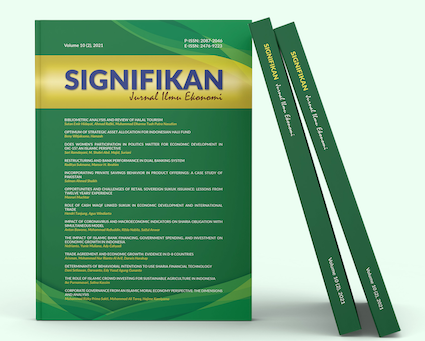The Impact of Islamic Bank Financing, Government Spending, and Investment on Economic Growth in Indonesia
DOI:
https://doi.org/10.15408/sjie.v10i2.20469Keywords:
Islamic banking, government spending, investment, VECMAbstract
This study aims to analyze the effect of Islamic bank financing, government spending, and investment on economic growth in Indonesia from 2003 to 2019. A quantitative descriptive methodusing the Vector Error Correction Model (VECM) analysis was applied. The results showed that in the short term, the variables of Islamic bank financing, government spending, and investment did not have a significant effect on economic growth. This shows that these variables require enough time to affect the economic growth. However in the long term, the results showed that Islamic bank financing and investment respectively have a significant, negative effect on economic growth, while government spending has a positive and significant effect on economic growth in Indonesia.JEL Classification: F22, F24, I32, J01, O15
How to Cite:
Nofrianto, Muliana, Y., & Cahyadi, A. (2021). The Impact of Islamic Bank Financing, Government Spending, and Investment on Economic Growth in Indonesia. Signifikan: Jurnal Ilmu Ekonomi, 10(2), 299-310. https://doi.org/10.15408/sjie.v10i2.20469.
References
Afandi, M. A., & Amin, M. (2019). Islamic Bank Financing And Its Effects On Economic Growth: A Cross Province Analysis. Signifikan: Jurnal Ilmu Ekonomi, 8(2), 243–250.
Abidin, Z. (2012). Meneropong Konsep Pertumbuhan Ekonomi (Telaah atas Kontribusi Sistem Ekonomi Islam atas Sistem Ekonomi Konvensional). Al Ihkam, 7(2), 356–367.
Afandi, M. A., & Amin, M. (2019). Islamic Bank Financing and Its Effects on Economic Growth: A Cross Province Analysis. Signifikan: Jurnal Ilmu Ekonomi, 8(2), 243–250.
Amusa, K., & Oyinlola, Mutiu Abimbola. (2019). The Effectiveness Of Government Expenditure On Economic Growth In Botswana. Journal of African Economic and Management Studies, 10(3), 368–384.
Anitasari, M., & Soleh, A. (2015). Pengaruh Pengeluaran Pemerintah Terhadap Pertumbuhan Ekonomi di Provinsi Bengkulu. Ekombis Review: Jurnal Ilmiah Ekonomi Dan Bisnis, 3(2), 117–127.
Asnuri, W. (2013). Pengaruh Instrumen Moneter Syariah dan Ekspor terhadap Pertumbuhan Ekonomi di Indonesia. Al-Iqtishad: Journal of Islamic Economics, 5, (2), 275-288.
Baehaqy, H. N., & Cahyono, E. F. (2019). Pengaruh Pembiayaan Perbankan Konvensional Dan Pembiayaan Perbankan Syariah Terhadap Pertumbuhan Ekonmi Di Indonesia Pada Tahun 2008-2018. Jurnal Ekonomi Syariah Teori Dan Terapan, 6, 1272–1286.
Gani, I. M., & Bahari, Z. (2020). Islamic Banking’s Contribution to The Malaysian Real Economy. ISRA International Journal of Islamic Finance, 13(1), 6-25.
Hasyim, L. T. U. (2016). Adapting Workplace Learning in The Time of Coronavirus. Akrual: Jurnal Akuntansi, 8(1), 11–27. https://doi.org/10.26740/Jaj.V8n1.P11-27
Hutabarat, P. (2016). Pengaruh Belanja Pegawai, Belanja Barang, Belanja Modal dan Jumlah Penduduk Terhadap Pertumbuhan Ekonomi Kabupaten/Kota di Provinsi Sumatera Utara. (Unpublished Thesis). Universitas Sumatera Utara.
Jamili, M. (2017). Pengaruh Pembiayaan Bank Syari’ah, Investasi dan Belanja Pemerintah Terhadap Pertumbuhan Ekonomi di Indonesia. Journal Ekonomi, Keuangan Dan Perbankan Syariah, 1(1), 34-54.
Jufrida, F., Syechalad, M. N., & Nasir, M. (2016). Analisis Pengaruh Investasi Asing Langsung (FDI) dan Investasi Dalam Negeri Terhadap Pertumbuhan Ekonomi Indonesia. Jurnal Perspektif Ekonomi Darussalam, 2(1), 54–68.
Lucas, Jr. R. E. (1988). On the Mechanics of Economic Development. Journal of Monetary Economics, 22(1), 3-42
McKinnon, R. I. (1973). Money and Capital in Economic Development. Washington DC : Brookings Institution.
Muazi, N. M., & Arianti, F. (2013). Analisis Pengaruh Penanaman Modal Asing dan Penananaman Modal Dalam Negeri Terhadap Pertumbuhan Ekonomi: di Jawa Tengah 1990 – 2010. Diponegoro Journal of Economic, 2(1), 1–9.
Nguyen, C. T., & Trinh, L. T. (2018). The Impacts of Public Investment on Private Investment and Economic Growth. Journal of Asian Business and Economic Studies, 25(1), 15–32. https://doi.org/10.1108/Jabes-04-2018-0003
Nofinawati. (2016). Perkembangan Perbankan Syariah di Indonesia. Juris (Jurnal Ilmiah Syariah), 14(2), 67–184. https://doi.org/10.31958/Juris.V14i2.305
Palupi, H. E., & Basuki, M. U. (2019). Analisis Pengaruh Investasi dan Budget Deficit Terhadap Pertumbuhan di Indonesia. Diponegoro Journal of Economics, 1(1), 67-79.
Patrick, H. (1966). Financial Development and Economic Growth in Underdeveloped Countries. Economic Development and Cultural Change, 14(2), 174-189.
Prastowo. (2018). Pengaruh Pembiayaan Perbankan Syariah Terhadap Pertumbuhan Ekonomi: Studi Empiris di 13 Negara. Hayula: Indonesian Journal of Multidisciplinary Islamic Studies, 2(1), 65–80. Https://Doi.Org/10.21009/Hayula.002.1.05
Robinson, J. (1952). The Generalisation of the General Theory, in the Rate of Interest, and Other Essays. 2nd Edition. London: Macmillan.
Shafwah, R., Zakaria, J., & Hasbi, A. M. (2019). Penanaman Modal Dalam Negeri dan Penanaman Modal Asing Terhadap Pertumbuhan Ekonomi di Kota Makassar Tahun 2008-2017. Paradoks : Jurnal Ilmu Ekonomi, 2(2), 133–141.
Sulistiawati, R. (2012). Pengaruh Investasi Terhadap Pertumbuhan Ekonomi dan Penyerapan Tenaga Kerja Serta Kesejahteraan Masyarakat di Provinsi di Indonesia. Jurnal Ekonomi Bisnis Dan Kewirausahaan, 3(1), 29–50.
Susilo, J., & Ratnawati, N. (2015). Analisis Pengaruh Pembiayaan Bank Syariah dan Tenaga Kerja Terhadap Peningkatan Produk Domestik Bruto (PDV): Analisis Sektoral Tahun 2006 – 2013. Seminar Nasional Cendekiawan.
Terminanto, A. A., & Rama, A. (2017). Pembiayaan Bank Syariah Terhadap Pertumbuhan Ekonomi: Studi Kasus Data Panel Provinsi di Indonesia. Iqtishadia: Jurnal Kajian Ekonomi dan Bisnis Islam, 10(1), 97-129.
Zahari, M. (2017). Pengaruh Pengeluaran Pemerintah Terhadap Pertumbuhan Ekonomi di Provinsi Jambi. Jurnal of Economics and Business, 1(1), 180-196.


